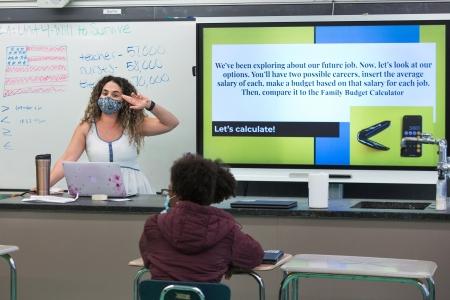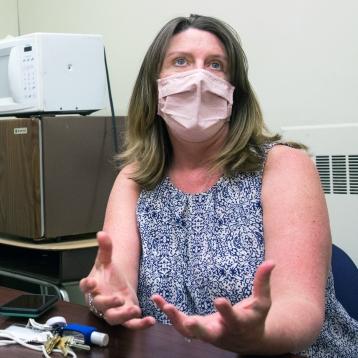Advisory powers

Teachers Sandy Morris Pryce (left) and Erica Bajana work together on a mural of optimism.

Teacher Victoriane Liz leads a discussion about budgeting with students during the advisory period.
When middle school buildings reopened in March, the staff at IS 238/the Susan B. Anthony Academy in Hollis, Queens, wanted to make sure students were OK — not just academically, but emotionally, too.
“We’ve had more kids in crisis,” said IS 238 Chapter Leader Elizabeth Leder. “There were more suicide attempts, and some kids had been hospitalized.”
The personal losses of the pandemic, compounded by isolation, had clearly taken a toll on students at IS 238, a Department of Education community school that has a partnership with the nonprofit Counseling in Schools.
But how to reach the students and give them a forum to discuss their concerns? How to identify students at risk? A team of faculty members came up with the idea of creating a weekly half-hour advisory period within the school day.
“The main goal is engagement and creating a safe space for students to discuss what happened to them and their families over the last year,” said Michael DeWolf, who teaches a 6th-grade self-contained special education class.
The advisory period team is composed of Leder, DeWolf, school counselor Ann Marie Mancuso and three other teachers — Victoriane Liz, Megan Jeffries and Cornelia Toma — plus Sara Kliger, the community school director, and Lorena Contreras, the school secretary.

Chapter Leader Elizabeth Leder says more students are in crisis at IS 238 in Queens since the pandemic started.
Before the program began in March, the team surveyed teachers about their level of skill and their comfort level with this kind of intervention and their willingness to participate. The advisory period is not therapy, Leder said, and no one would have to take on crisis intervention alone. Counselors and deans would be available to make sure students in crisis get the help they need.
“It’s a way to get students on our radar,” said Mancuso.
The team created a 10-week advisory period activity plan that is age-appropriate and includes topics that address not just social-emotional needs but school-related and career-related concerns, too: self-awareness and self-management skills would be discussed along with decision making, report cards, test anxiety, careers and budgeting. In that way, the period looks to the future, giving students an opportunity to think positively about the road ahead.
The weekly advisory period takes place as a 30-minute lesson within a 55-minute class period, with the flexibility to go longer if necessary, and every class deals with the same topic of the week. Teachers working with remote students are sent slides via Google Classroom, while in-person teachers receive scripted lessons. But teachers have the flexibility to approach the advisory period in their own way.
“Every week would be something different,” Kliger said. “It allows for openness and enjoyment.”
DeWolf starts each of his advisory periods with an open forum. “I ask, ‘What’s on your mind; What’s up with you?’” he said. “Kids can go off on a tangent.”
DeWolf’s students have discussed a range of issues during this time. Some have lost parents or guardians to COVID-19 or had a parent lose a job. A stay-at-home mom was suddenly forced to go back to work, and older siblings had to find jobs to help support the family instead of continuing their education. Other concerns are more prosaic. Many are “itching to go back outside,” said DeWolf, and others discuss struggling to carve out quiet time for homework.
“They bounce ideas off of one another,” DeWolf said.
Victoriane Liz teaches 7th-grade English language arts, but during one recent advisory period the topic was careers, budgeting and motivation. Students are learning a new vocabulary and thinking of the future. “To figure out your monthly income, divide the gross salary by 12 months,” Liz instructed the class. A lively discussion ensued, with students working out on their calculators their projected salaries and costs, such as housing, food and clothing.
Emmanuel, 12, who wants to be an art teacher, said he’d like to move to Florida to cut living expenses.
Garniela, also 12, is thinking of being a homicide detective or a lawyer, and is already counting on a husband to contribute his income. Thinking about careers and budgeting has given her a new appreciation for her family. “My parents have four kids, and they have to pay for us and themselves,” she said.
In that way, the advisory period has accomplished its goals: IS 238 students are taking a fresh look at their lives and thinking about what the future might be like as they move past one of the most difficult years of their young lives.